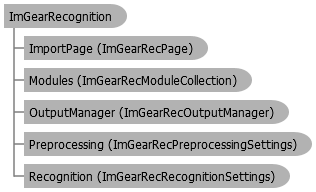

ImageGear .NET v24.14 - Updated
ImGearRecognition Class

'Declaration Public NotInheritable Class ImGearRecognition Inherits ImGearRecSettingsCollectionObjectBase
'Usage Dim instance As ImGearRecognition
public sealed class ImGearRecognition : ImGearRecSettingsCollectionObjectBase
public __gc __sealed class ImGearRecognition : public ImGearRecSettingsCollectionObjectBase
public ref class ImGearRecognition sealed : public ImGearRecSettingsCollectionObjectBase
This object provides access to the Recognition engine. An application must first instantiate this object in order to perform any recognition tasks. Multiple instances of this object can exist within a process, though only the first instance will initialize the underlying native Recognition engine, and all subsequent instances will obtain a reference to it. The last instance that explicity calls its Dispose method or is cleaned up from garbage collection will shut down the Recongition engine.
While all instances of this object will access the same underlying Recognition engine, each instance operates on its own set of pages and documents. Each instance can use the shared global collection of Recognition settings by instantiating it with the default constructor. This means that changing settings (e.g. ImGearRecOutputManager.Format) in one instance will affect all other instances using the global settings. To isolate the Recognition settings for each instance, use the overloaded constructor, ImGearRecognition Constructor(Boolean). This will force each instance to use its own collection of unique settings.
Multiple instances of this object can be used in separate threads to perform recognition activities on different images and pages in parallel. However, it is important to remember that for each page, the recognition process must occur sequentially, meaning that a page must first be imported and pre-processed before it can be recognized and exported. Also, access to the underlying formatted output module is synchronized, so only one instance can export to a formatted output document at a time.
System.Object
ImageGear.Recognition.ImGearRecSettingsCollectionObjectBase
ImageGear.Recognition.ImGearRecognition